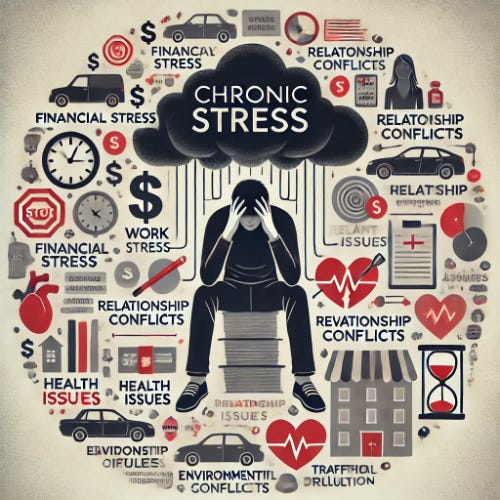Disruptive Change and Organisational Success (PART 1 of 3)
Why Leaders Need Neuroscience to Lead Effectively Today
‘May you live in interesting times’ is an expression that’s often claimed to be a Chinese curse, with ‘interesting’ ironically insinuating ‘troubled’ rather than exciting or fun. A British politician used this sentiment at the end of the 19th century when the Spanish-American war was underway and Great Britain was involved in colonial disputes with France. (1)
Fast forward to today, no one could argue that we aren’t living through much more ‘interesting’ times now. Global and national, economic, environmental, political, societal, technological, and human wellbeing challenges are complex and compounding.
Most people feel a sense of overwhelm because they feel they have no control over what’s unfolding. But what if there are things we can do to help us navigate these treacherous times?
What if we can bring more clarity of mind to our challenges?
Why this article?
Marcus Dimbleby talks a lot about the need to think differently in today’s complex world - for all the operational, economical, and societal reasons why that needs to happen.
But there are also physical, cognitive, and emotional aspects that must be considered - which is the focus of the work of Dr Delia McCabe - and these two aspects - psychological and physiological - are highly intertwined, impacting how we think and behave.
The reality is, in today’s VUCA (Volatile, Uncertain, Complex, Ambiguous) world, our brain is under threat, and it should come as no surprise to anyone why stress levels, burnout, mental health issues, and suicides are on the rise.
And this isn’t just impacting executives in high stress environments, we are seeing this across all levels in the workplace and, even more worrying, our children have already been impacted and we are implicit … Now is the time for action.
Some basic neuroscience
The human brain dislikes not feeling in control. In fact, the worst kind of stress for our brain is when it feels no action can remedy a challenge.
This stems from a neurophysiological perspective, wherein our stress response lasts from between 30 - 60 seconds, to support action.
Within that time frame, we either escaped the physical stressor, which meant the stress response could taper off, via a specific feedback loop, or we’d lose the fight and/or flight and the stress response was no longer necessary.
In other words, if you escape the tiger, you no longer need the stress response, and similarly, if you become its lunch.
Our challenges today are seldom physical, yet the stress response maintains its integrity, synthesising stress hormones which pump glucose into our muscles to support instant physical, survival action.
In a life-threatening situation it makes perfect sense to experience and act on what is called a ‘narrowed thought-action’ repertoire.
Such quick and decisive action can save your life - it has a direct and immediate benefit. In his book, Thinking, Fast and Slow, Dr. Daniel Kahneman refers to this action as “System 1 thinking” - instinctive, intuitive, fast. Conversely, Kahneman’s “System 2 thinking” is more logical, rational, slower, and considered. (2)
What’s different today?
Today we are dealing primarily with psychological stressors, which introduce other factors that need to be recognised.
Individuals faced with such stressors access memories around what they may or not have encountered and actioned previously, along with emotions around the resources they have to cope with the stressors.
In other words, humans who experience chronic psychological stress, apart from experiencing the physiological impact, also embark on a cognitive evaluation of what they have available to deal with their current stressors.
Furthermore, personality/dispositional characteristics, early experiences, and genetic predispositions may further contribute to individual idiosyncrasies in relation to the stress response.
Intense time pressure, work overload, too much responsibility, threat, competition and role and conflict strain are also well recognised factors that contribute to overstimulation and stress in individuals.
All of which can lead to poor decision-making, poorly considered, and reactive (System 1), rather than quality decisions, considered actions, and responsive (System 2) behaviours.
Chronic exposure to stress coupled with individual challenges leads to the development of habitual thoughts - habits of mind - and behaviour, which undermines the capacity to think critically, creatively, and make innovative choices and decisions because of what happens in the brain when it is exposed to chronic stress.
What about our workplaces?
Consider how this exposure impacts behaviors in the workplace, often without realisation.
This is where we often see what we term oblivious compliance, a state of sheep-like passivity with people tiredly trudging along on the conformity conveyor belt, content with the daily humdrum, not even seeing things that require challenging, let alone able to do so if they did.
This state of oblivious compliance is even more dangerous than groupthink, a term coined by Irving Janus in 1971 that reflects the false harmony of people going along with each other to keep the peace, to not rock the boat, even when they know an issue exists, but maintaining harmony is deemed more important. (3)
Why is oblivious compliance more dangerous? Because at least with groupthink there is a level of awareness that may at some point trigger the required action. It is therefore vital to identify when there is chronic exposure to stress in the workplace.
The illusion of increased productivity via technology
One of the challenges with workplaces in the modern world is the plethora of productivity and/or communication apps. Gloria Marks, an Informatics researcher at the University of California, who examines how humans use technology and the effects of distraction, has uncovered a few disturbing trends: (4)
• In 2003/4, average attention span on any screen was 2 ½ minutes average
• In 2012, it was 75 seconds
• In the last 5 – 6 years the average is 47 seconds
• People check their email up to 77 times per day (and 373 times on the high end)
Furthermore, research funded by Gartner found that, in 2019, desk workers used nearly 50% less work apps than they did in 2023 – i.e. six then and 11 now. The results from nearly 5,000 participants revealed some startling facts:
• Employees struggled to find the information to do their work and more than 33% missed important updates due to information overload.
• 33% said they made incorrect decisions due to a lack of awareness over key information.
• 45% said they received irrelevant notifications. (5)
Slack revealed after assessing the results of 10,000 Slack users that:
• 2 hours of daily meetings was the limit for most people.
• Those self-reporting on too many Zoom or conference calls were twice as likely to say they didn’t have enough time to focus on their work.
• More than 50% of executives said they had too many meetings, and 27% of team members said the same.
• 2 out of 5 workers were forced to complete work after hours at least once per week regardless of whether the meetings were virtual or in-person. (6)
Combine these results with the trends from Marks’ research and we can see clearly that we have more distractions now, coupled with less focused time on tasks, and more information.
Unsurprisingly, this does not lead to better decision-making.
In fact, David Lewis coined the term ‘Information Fatigue Syndrome’ nearly two decades ago. Today, other researchers speak about ‘Information Stress’ or ‘Information Overwhelm.’ Lewis also believes that “uncontrolled, unorganised, and excessive information can hinder learning, decision-making, and well-being.
If you want to read more about ‘Information Fatigue Syndrome’ please click the button below:
We know Lewis is correct because we know which part of the brain is used to decipher and analyse data and make decisions around it. (More on this later.)
Leaders must acknowledge that optimal decision-making cannot occur in an environment where individuals feel overwhelmed by too much information, regardless of the source, including attending too many meetings.
Whatever the source, excess information leads to both acute and chronic stress, neither of which supports optimal decision-making. Research into behavior under acute and chronic stress has highlighted what the brain prefers to do when it is experiencing stress.
Lenow and colleagues suggested that many of the decisions we make as humans revolve around us weighing up our known versus our unknown options. (7)
They hypothesised that under stressful conditions we’d revert to ‘exploitive’ behaviour in relation to our environment, i.e. we’d revert to known options.
Conversely, in the absence of stress, we’d be willing to ‘explore’ our environment for previously unexamined options, i.e. we’d consider unknown options. In other words, in the presence of stress, we’d prefer stability rather than novelty.
It’s clear once you ‘get’ it
It is now easier to understand why such stress can be highly detrimental in the modern-day workplace when, as we mentioned earlier, we are operating in a VUCA world.
In such an environment, when faced with high levels of complexity and ambiguity, it is vital that we experiment, to realise that known options may not work, so we therefore explore and consider alternatives, and attempt to surface options and ideas that we may not yet have considered.
To do this under acute and chronic stress is practically impossible because the brain will simply not be able to operate as needed and will constantly be in System 1 mode.
This is why Applied Critical Thinking is such an important skill to master, enabling you to override your brain’s default response, and engage System 2 mode.
The results of this research suggest that acute physiological and chronic psychological stress bias our decision-making towards the over-exploitation of available and known resources - we comfortably go with ‘what we know’ - despite diminishing returns.
It takes less neural energy to revert to habitual thinking and behaviour versus the opposite, so our lazy, energy-saving brain takes us down the familiar route.
This is the conundrum of operating in an environment that, without the understanding and proper training, actually induces the very state that prevents the creation of the required solutions.
We will address the concept of neural energy in more detail PART 2 as it is critical to understand why engagement is so low, with 50% of the US workforce ‘quiet-quitting’ in 2023, why burnout rates are between 40+ and 60+% in the US and Australia respectively, and why mental health challenges have reached new highs, with current depression and clinical depression in lifetime both hitting new highs in the US.
We’ll also address what the aviation industry can teach organisations, cognitive flexibility and habitual cognition, neuroscience basics for organisations, and more about what stress does to the brain - but good news to counter it - using our body and mind.
In PART 3 we will address solutions to drive success in organisations, ‘unbound’ / ‘distributed’ cognition, Modern Burnout, feelings vs cognition and how the next generation is coping with life.
To ensure you get Part 2 and 3 in your inbox when they’re available, please subscribe below.
References
(1) 1936 March 21, The Yorkshire Post, Lesson of the Crisis: Sir A. Chamberlain’s Review of Events, Quote Page 11, Column 7, Leeds, West Yorkshire, England. (British Newspaper Archive).
(2) Kahneman, Daniel, 1934-2024, (2011), Thinking, fast and slow, New York: Farrar, Straus and Giroux.
(3) https://agcommtheory.pbworks.com/f/GroupThink.pdf
(4) Gloria Mark, Attention Span: A Groundbreaking Way to Restore Balance, Happiness and Productivity; Hanover Square Press, 2023.
(5) https://www.gartner.com/en/newsroom/press-releases/2023-05-10-gartner-survey-reveals-47-percent-of-digital-workers-struggle-to-find-the-information-needed-to-effectively-perform-their-jobs
(6) https://www.bnnbloomberg.ca/two-hours-of-daily-meetings-is-the-limit-slack-survey-shows-1.2007408
(7) Lenow JK, Constantino SM, Daw ND, Phelps EA. Chronic and Acute Stress Promote Overexploitation in Serial Decision Making. J Neurosci. 2017 Jun 7;37(23):5681-5689.













Delighted to have written this Three Part article with you Marcus Dimbleby! Organisational success can be achieved with significantly less stress and more fun - for everyone involved. Here's to this becoming the norm vs. what we're seeing everywhere!
Thank you Delia and Marcus. Critical conversation and thinking is required to help solve this problem!